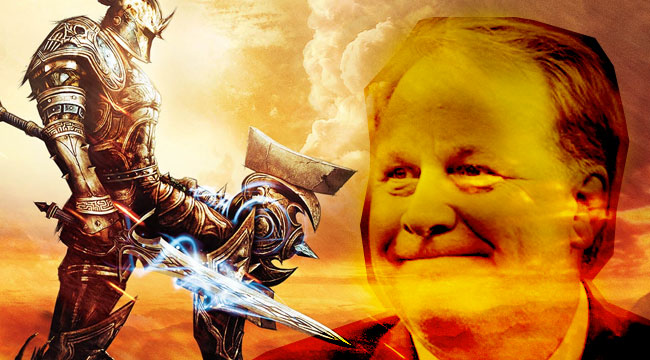
Curt Schilling has spent much of the past year getting in trouble on social media, whether he’s comparing Muslims to Nazis or just this week insisting that “men’s rooms were designed for the penis” and that trans people should use the restroom of their assigned-at-birth gender. One piece of news Schilling has stayed oddly silent on, however, is the latest step in the legal drama surrounding his shuttered video-game studio, with state officials facing fraud charges from the Securities and Exchange Commission. It’s just the latest moment in a years-long drama that saw Schilling cost taxpayers millions so he could chase his dream of developing video games.
Ruler Of The Kingdom
In 2006, Schilling announced the founding of Green Monster Games, later renamed 38 Studios, in Maynard, Massachusetts, to develop a game in the style of World of Warcraft. The company had some flashy talent across the board — in addition to Schilling, popular fantasy author R.A. Salvatore and popular comic-book artist and toy designer Todd McFarlane were part of the creative team, and Schilling recruited game industry veterans such as Brett Close and Jon Laff to run the company, and in 2009 bought Big Huge Games, a beloved developer of strategy games.
From the start, though, Schilling was unhappy with how he was treated by the state of Massachusetts. Schilling campaigned for enormous tax credits from the state under Massachusetts’ film tax credit program. But despite the stereotypes of Red Sox Nation, love of players only goes so far: Schilling got nowhere.
The state had excellent reason to be skeptical of Schilling’s claims. Despite the success of World of Warcraft, this particular genre of game, the MMORPG, is notoriously difficult to break into, let alone build into a profitable franchise. Even seemingly sure things, like Star Wars: The Old Republic, ultimately didn’t achieve the level of success Schilling was promising. Most MMOs these days are free to play and make money by selling players cosmetic items, and are most popular in Asia, but Schilling’s game would be built on subscriber revenue.
Rhode Island, however, was happy to bring 38 Studios to the state, and gave Schilling’s company a $75 million loan through the state’s economic development arm. 38 Studios claimed it would bring 450 jobs to Rhode Island by the end of 2012. As part of that, it announced Kingdoms of Amalur: Reckoning, a single-player game that would introduce players to the world of the MMO, called Project Copernicus, which would launch soon after.
The Fall
In February 2012, Kingdoms of Amalur: Reckoning arrived to generally positive reviews, but to relatively tepid sales. The issue was, simply, to make the kind of money 38 Studios needed, it needed to sell at least three million copies: By the end of its first month on the shelves, it’d sold only a tenth of that. For all the hype surrounding the game and the talent behind it, it was a solid but unspectacular open-world action RPG, a fairly common experience players could find elsewhere. Amalur just didn’t stand out.
The reckoning, long brewing behind the scenes, was swift and painful. On May 18th, the studio sent the state of Rhode Island a bad check for its $1.125 million loan payment and less than a week later, 38 Studios summarily closed, firing its entire staff. Almost immediately, no fewer than four separate law enforcement agencies launched investigations into 38 Studios and how it was funded. Rhode Island quickly sued and in 2014, settled for $4.4 million.
At issue, and what the SEC is currently attempting to figure out, is whether 38 Studios could have ever delivered on what it promised to Rhode Island. MMOs are expensive games: In addition to the development costs, studios have to pay for infrastructure to run the game, and staff to moderate disputes and keep the game running behind the scenes. A recent MMO, The Elder Scrolls Online, was rumored to cost $200 million just to create the game itself. Was 38 Studios, and Schilling, just overconfident his name and number could sell video games? Or did they deliberately defraud taxpayers to chase a dream?
The Empty Kingdom
Schilling, for his part, claims he lost $50 million of his own money on 38 Studios, although he continues to blame former Rhode Island Gov. Lincoln Chaffee, referring to him as “Mrs. Chaffee,” for the mess. As for the game Schilling dreamed of, and the state of Rhode Island paid millions for, it currently sits somewhere in the state archives, waiting to be sold off.
And there it will likely remain, an empty kingdom built on either belief or deception, depending on the ruling of the courts. The game is unlikely to be revived, let alone finished, but the story behind it will linger on for a while yet.
